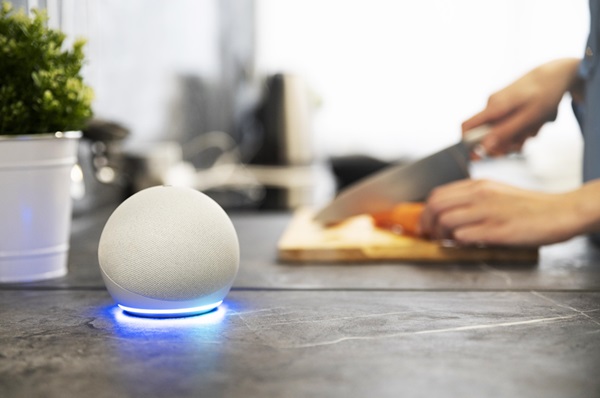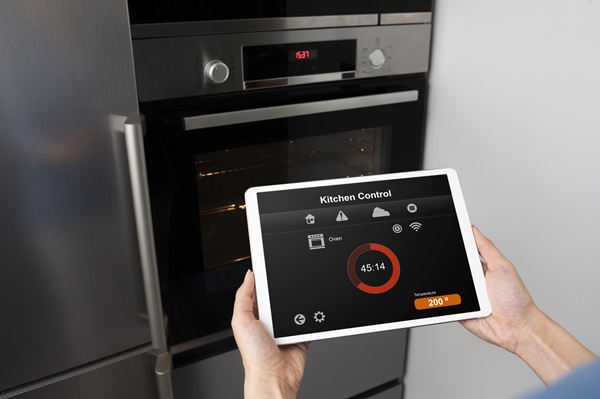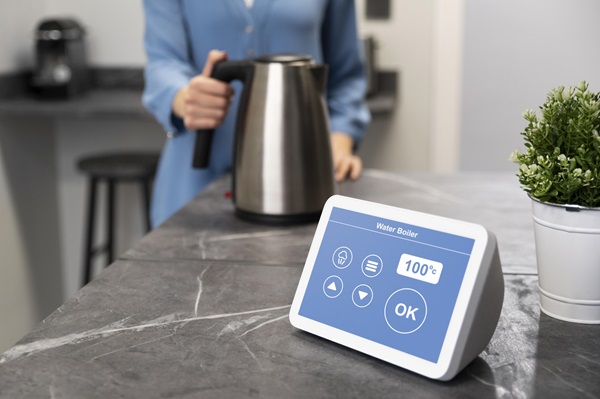The smart kitchen system represents a revolutionary advancement in home technology, integrating cutting-edge devices and connectivity to enhance culinary experiences. These systems encompass a range of intelligent appliances and connected devices designed to streamline cooking, improve efficiency, and elevate convenience in the kitchen. As we look to the horizon, smart kitchen systems are set to redefine how we interact with our cooking spaces, offering innovations that promise to make meal preparation more precise, automated, and seamlessly integrated with our daily lives.

I. Introduction
A. Overview of Smart Kitchen Systems
Smart kitchen systems represent a significant leap in home technology, integrating advanced appliances, connected devices, and intelligent software to enhance cooking and kitchen management. These systems are designed to make everyday kitchen tasks more efficient, convenient, and enjoyable.
B. Evolution of Kitchen Technology
From the introduction of basic appliances like refrigerators and microwaves to today’s sophisticated smart kitchen systems, kitchen technology has continually evolved. Early innovations focused on automating cooking processes, while modern systems emphasize connectivity, real-time monitoring, and customization.
C. Objectives of the Article: Exploring How Smart Kitchen Systems Are Transforming Cooking and Efficiency
This article aims to explore how smart kitchen systems are revolutionizing the culinary experience. We will delve into their components, benefits, and impacts on cooking efficiency, personalization, food safety, and overall kitchen management.
II. Understanding Smart Kitchen Systems
A. Definition and Key Components of Smart Kitchen Systems
1. Smart Appliances
Smart kitchen systems include various appliances such as refrigerators, ovens, and cooktops equipped with advanced features. These appliances can be controlled remotely, offer real-time data, and integrate with other smart devices.
2. Connected Devices and Sensors
Sensors and connected devices in smart kitchens monitor various aspects like temperature, humidity, and food storage conditions. These devices provide valuable data for optimizing kitchen operations.
3. Voice Assistants and Control Systems
Voice-controlled assistants and centralized control systems enable hands-free operation and easy management of smart kitchen devices. They offer convenience and enhance user interaction.
B. Integration of IoT (Internet of Things) in the Kitchen
The integration of IoT in smart kitchen systems allows devices to communicate and share data seamlessly. This connectivity enables remote monitoring, automated tasks, and data-driven insights, enhancing the overall kitchen experience.
C. Benefits of Adopting Smart Kitchen Technology
Adopting smart kitchen technology offers numerous benefits, including increased efficiency, convenience, and energy savings. These systems help streamline cooking processes, reduce food waste, and provide real-time information for better kitchen management.
III. Enhancing Cooking Efficiency with Smart Technology
A. Automated Cooking Processes
1. Smart Ovens and Cooktops:
Smart ovens and cooktops offer precision cooking, recipe guidance, and automated temperature adjustments. They ensure optimal cooking results and reduce the need for manual intervention.
2. Robotic Cooking Assistants and Multi-Function Cookers
Robotic cooking assistants and multi-function cookers automate various cooking tasks, from chopping and stirring to cooking complex meals. They simplify meal preparation and save time.
B. Real-Time Monitoring and Control
1. Remote Access and Mobile Apps for Kitchen Management
Mobile apps allow users to monitor and control smart kitchen appliances remotely. This feature provides flexibility and convenience, enabling users to manage their kitchen from anywhere.
2. Monitoring Food Storage and Expiry Dates
Smart kitchen systems with inventory management capabilities track food storage conditions and expiry dates. This monitoring helps reduce food waste and ensures the freshness of ingredients.
C. Energy Efficiency and Sustainability
1. Energy-Saving Features in Smart Appliances
Smart kitchen appliances are designed with energy-saving features that minimize power consumption. These features contribute to lower utility bills and a reduced environmental footprint.
2. Reducing Food Waste Through Smart Inventory Management
Efficient inventory management and real-time tracking help minimize food waste by ensuring ingredients are used before they spoil.

IV. Personalization and Convenience in the Smart Kitchen
A. Customized Cooking Experiences
1. AI-Driven Recipe Recommendations and Meal Planning
AI-powered systems offer personalized recipe recommendations and meal planning based on dietary preferences and nutritional needs. This customization enhances the cooking experience and promotes healthier eating.
2. Adapting Recipes to Dietary Preferences and Nutritional Needs
Smart kitchen systems can adjust recipes to meet specific dietary requirements, making it easier to prepare meals that align with individual health goals.
B. Hands-Free Assistance
1. Voice-controlled appliances and Virtual Assistants
Voice-controlled appliances and virtual assistants enable hands-free operation, allowing users to perform tasks and control devices with simple voice commands. This convenience enhances the overall kitchen experience.
2. Automated Grocery Ordering and Delivery Integration
Integration with grocery ordering and delivery services simplifies the process of restocking kitchen supplies. Automated systems can place orders based on inventory levels and usage patterns.
V. Smart Kitchen Systems and Food Safety
A. Ensuring Food Safety with Smart Sensors
1. Temperature and Humidity Monitoring
Smart sensors monitor temperature and humidity levels in real-time, ensuring that food is stored under optimal conditions. This monitoring helps prevent spoilage and contamination.
2. Alerts for Potential Contamination or Spoilage
Smart kitchen systems can send alerts for potential contamination or spoilage, allowing users to take timely action to protect food safety.
B. Improving Hygiene and Cleaning
1. Self-Cleaning Appliances and Sanitation Features
Self-cleaning appliances and advanced sanitation features help maintain a clean and hygienic kitchen environment. These features reduce the need for manual cleaning and ensure appliance longevity.
2. Monitoring and Managing Kitchen Cleanliness
Smart kitchen systems can monitor kitchen cleanliness and provide recommendations for maintaining a sanitary environment. This functionality helps prevent the buildup of germs and contaminants.
VI. Case Studies and Examples
A. Successful Implementations of Smart Kitchen Systems
1. Notable Innovations by Leading Brands
Leading brands have introduced innovative smart kitchen systems that showcase advanced features and technologies. Examples include smart refrigerators with AI-driven inventory management and ovens with remote control capabilities.
2. Real-World Applications and User Experiences
Case studies of real-world applications highlight the practical benefits of smart kitchen systems. User experiences demonstrate how these systems improve cooking efficiency, convenience, and overall satisfaction.
B. Analysis of Impact on Cooking and Home Management
1. Efficiency Gains and User Satisfaction
Analyzing the impact of smart kitchen systems reveals significant efficiency gains and high levels of user satisfaction. Users appreciate the convenience, precision, and energy savings provided by these technologies.
2. Lessons Learned from Early Adopters
Early adopters of smart kitchen systems have provided valuable insights into the benefits and challenges of these technologies. Lessons learned from their experiences can inform future implementations and improvements.

VII. Challenges and Considerations
A. Cost and Accessibility of Smart Kitchen Technology
1. Pricing of Smart Appliances and Systems
The cost of smart kitchen appliances and systems can be a barrier for some consumers. Understanding pricing and evaluating the return on investment is essential for making informed purchasing decisions.
2. Affordability and Return on Investment
Assessing the affordability of smart kitchen technology and its potential return on investment helps consumers determine the value of upgrading their kitchen.
B. Privacy and Security Concerns
1. Data Security in Connected Devices
The use of connected devices raises concerns about data security and privacy. Ensuring that smart kitchen systems have robust security measures is crucial for protecting personal information.
2. Protecting Personal Information and Usage Data
Protecting personal information and usage data is essential for maintaining user trust and ensuring the safe operation of smart kitchen systems.
C. Integration and Compatibility Issues
1. Ensuring Seamless Operation of Multiple Devices
Integrating multiple smart kitchen devices requires ensuring seamless operation and compatibility. Addressing integration challenges helps create a cohesive and functional kitchen environment.
2. Overcoming Technical Challenges
Technical challenges, such as connectivity issues and software compatibility, must be addressed to ensure the smooth operation of smart kitchen systems.
VIII. Future Trends in Smart Kitchen Systems
A. Emerging Technologies and Innovations
1. Advances in AI and Machine Learning for Cooking
Advances in AI and machine learning are expected to drive further innovations in smart kitchen systems. These technologies will enhance cooking precision, recipe customization, and overall kitchen automation.
2. Integration with Home Automation Systems
The integration of smart kitchen systems with broader home automation systems will create a more interconnected and intelligent living environment.
B. The Role of Smart Kitchens in Sustainable Living
1. Promoting Eco-Friendly Practices
Smart kitchen systems will play a role in promoting eco-friendly practices, such as energy conservation and waste reduction. These systems will support sustainable living by optimizing resource use and minimizing environmental impact.
2. Future Developments in Sustainable Kitchen Technology
Future developments in smart kitchen technology will focus on sustainability, with innovations aimed at reducing energy consumption and supporting green practices.
IX. Conclusion
A. Recap of How Smart Kitchen Systems Are Revolutionizing Cooking and Efficiency
Smart kitchen systems are revolutionizing the culinary experience by enhancing efficiency, convenience, and precision. These technologies are transforming cooking and home management, providing users with advanced tools for a smarter kitchen.
B. Strategic Recommendations for Adopting Smart Kitchen Technology
To maximize the benefits of smart kitchen technology, consumers should consider their needs, budget, and compatibility requirements. Strategic adoption of these systems can lead to improved cooking experiences and overall kitchen efficiency.
C. Final Thoughts on the Future of Smart Kitchens and Culinary Innovation
The future of smart kitchens promises continued innovation and advancement, with new technologies driving further improvements in cooking and home management. Embracing these advancements will lead to a more connected, efficient, and enjoyable kitchen experience.

